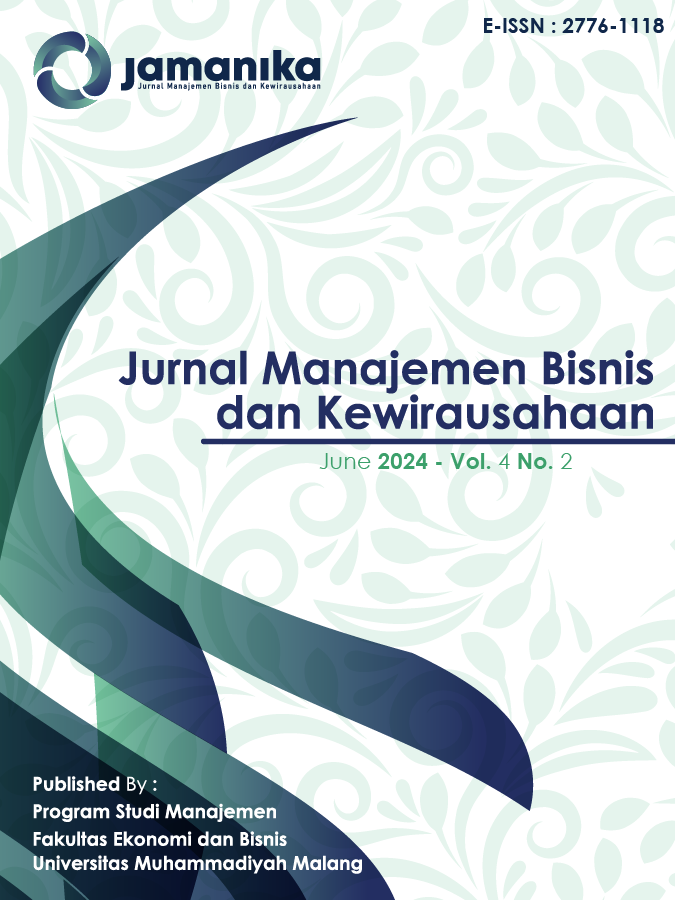The Effect of Financial Knowledge, Financial Attitudes and Financial Management Behavior on Financial Satisfaction of Gopay Fintech Users in Malang City
DOI:
https://doi.org/10.22219/jamanika.v4i2.33637Keywords:
financial knowledge, Financial Attitude, financial management behavior, financial satisfactionAbstract
This study aims to determine the effect of financial knowledge, financial attitude and financial management behavior on financial satisfaction among fintech gopay users in Malang city. The number of samples in this study were 100 respondents with a purposive sampling method. The object of this research is the people of Malang city. The data analysis method used is multiple linear regression with SPSS 25 software. The results of this study indicate that the three independent variables, namely financial knowledge, financial attitudes and financial management behavior simultaneously and partially influence financial satisfaction.
Downloads
References
Ajzen, I. (1991). The Theory of Planned Behavior. Organizational Behavior and Human Decision Processes, 50, 179–211.
Ajzen, I. (2005). Attitude, Personality and Behaviour (Second Edition). Open University Press.
Amalia, S. T., & Asandimitra, N. (2022). Pengaruh Pendapatan, Hutang, Financial Strain, Financial Attitude, dan Financial Literacy terhadap Financial Satisfaction: Financial Management Behaviour sebagai Mediasi. Jurnal Ilmu Manajemen, 10(1), 312–328.
Arifin, A. Z. (2018a). Influence Factors toward Financial Satisfaction with Financial Behavior as Intervening Variable on Jakarta Area Workforce. European Research Studies Journal, 21(1), 90–103.
Arifin, A. Z. (2018b). Influence of Financial Attitude, Financial Behavior, Financial Capability on Financial Satisfaction. Advances in Social Science, Education and Humanities Research (ASSEHR), 186, 100–103.
Armilia, N., & Isbanah, Y. (2020). Faktor yang Memengaruhi Kepuasan Keuangan Pengguna Financial Technology di Surabaya. Jurnal Ilmu Manajemen, 8(1), 39–50.
Diener, E., Oishi, S., & Lucas, R. E. (2003). Personality, Culture, and Subjective Well-being: Emotional and Cognitive Evaluations of Life. Annual Review of Psychology, 54, 403–425. https://doi.org/10.1146/annurev.psych.54.101601.145056
Falahati, L., Sabri, M. F., & Paim, L. H. J. (2012). Assessment a model of financial satisfaction predictors: Examining the mediate effect of financial behaviour and financial strain. World Applied Sciences Journal, 20(2), 190–197. https://doi.org/10.5829/idosi.wasj.2012.20.02.1832
Garman, E. Thomas., & Forque, R. E. (2010). Personal Finance (10th ed.). South-Western Cengage Learning.
Goodman, J. E. (2007). Master your money type : Menggunakan Kepribadian Keuangan Anda untuk Menciptakan Kekayaan dan Kebebasan (M. Renny & S. Faridi, Eds.). B-First.
Hasibuan, B. K., Lubis, Y. M., & HR, W. A. (2018). Financial Literacy and Financial Behavior as a Measure of Financial Satisfaction. Advances in Economics, Business and Management Research (AEBMR), 46, 503–507.
Herdjiono, I., & Damanik, L. A. (2016). Pengaruh financial attitude, financial knowledge, parental income terhadap financial management behavior. Jurnal Manajemen Teori Dan Terapan | Journal of Theory and Applied Management, 9(3).
Ida, & Dwinta, C. Y. (2010). Pengaruh Locus of Control, Financial Knowledge, Income terhadap Financial Management Behavior. Jurnal Bisnis Dan Akuntansi, 12(3), 131–144.
Kholilah, A. N., & Iramani, Rr. (2013). Studi Financial Management Behavior pada Masyarakat Surabaya. Journal of Business and Banking, 3(1), 69–80.
Lintner, G. (1998). Behavioral Finance: Why Investors Make Bad Decisions (The Planner, 1-8).
Manurung, A. H., & Rizky, L. T. (2009). Succesful Financial Planner: A Complete Guide. Grasindo.
Narulloh, M. B., Hartono, U., & Aji, T. S. (2022). Analysis of Financial Attitude, Financial Knowledge, Income and Financial Behavior as Mediation Variables on the Financial Satisfaction of Workers in the City of Gresik in the Era of the Covid-19 Pandemic. International
Journal of Multicultural and Multireligious Understanding, 9(9), 362–372. https://doi.org/10.18415/ijmmu.v9i9.4119
Pankow, D. (2012). Financial Values, Attitudes, and Goals. Family Economic Specialist, NDSU.
Prabowo, M. S., & Asandimitra, N. (2021). Faktor yang Memengaruhi Financial Satisfaction Pengguna E-Commerce di Surabaya. Jurnal Ilmu Manajemen, 9(1), 28–41.
Qurotaa’yun, Z., & Krisnawati, A. (2019). Pengaruh Literasi Keuangan Terhadap Perilaku Konsumtif Generasi Milenial Di Kota Bandung. Journal Accounting and Finance, 3(1), 46–53.
Rajna, A., & Anthony, P. (2011). Knowledge, Attitude, Practice And Satisfaction On Personal Financial Management Among The Medical Practitioners In The Public And Private Medical Services In Malaysia. https://www. researchgate. net/profile/Anthony_Rajna/publication
Robbins, S. (2015). Perilaku Organisasi . Salemba Empat.
Rumondang, A., Sudirman, A., Effendy, F., Simarmata, J., & Agustin, T. (2019). Fintech: Inovasi Sistem Keuangan di Era Digital. Yayasan Kita Menulis.
Rusdini, D. A. (2021). Faktor yang Memengaruhi Financial Satisfaction pada Masyarakat Kabupaten Pamekasan. Jurnal Ilmu Manajemen, 9(1), 182–190.
Sa’diyah, C., & Pratika, Y. (2022). Understanding The Intention Of Millennial Generation On Investment Through The Financial Technology Application. International Journal of Economics, Business, and Accounting Research (IJEBAR), 6(2), 1–12.
Sherlyani, M., & Pamungkas, A. S. (2020). Pengaruh Financial Behavior, Risk Tolerance, Dan Financial Strain Terhadap Financial Satisfaction. Jurnal Manajerial Dan Kewirausahaan, 2(1), 272–281.
Siswoyo, U. N. H., & Asandimitra, N. (2021). Pengaruh Income, Debt, Gender Differences, Financial Literacy, dan Financial Attitude terhadap Financial Satisfaction. Jurnal Ilmu Manajemen, 9(4), 1549–1562.
Wediawati, B., Maqiyah, R., Setiawati, R., Ekonomi, F., Jambi, U., & Jambi, K. (2022). Determinan Kepuasan Keuangan (Financial Satisfaction) Berbasis Literasi Keuangan pada Pengguna Fintech Shopeepay. Jurnal ManajemenTerapan Dan Keuangan (Mankeu), 11(02).
Widagdo, B., & Sa’diyah, C. (2023). Business sustainability: Functions of financial behavior, technology, and knowledge. Problems and Perspectives in Management, 21(1), 120–130. https://doi.org/10.21511/ppm.21(1).2023.11
Downloads
Published
Issue
Section
License
Copyright (c) 2024 Ria Rahmawati Dewi, Mursidi, Warsono

This work is licensed under a Creative Commons Attribution-ShareAlike 4.0 International License.







